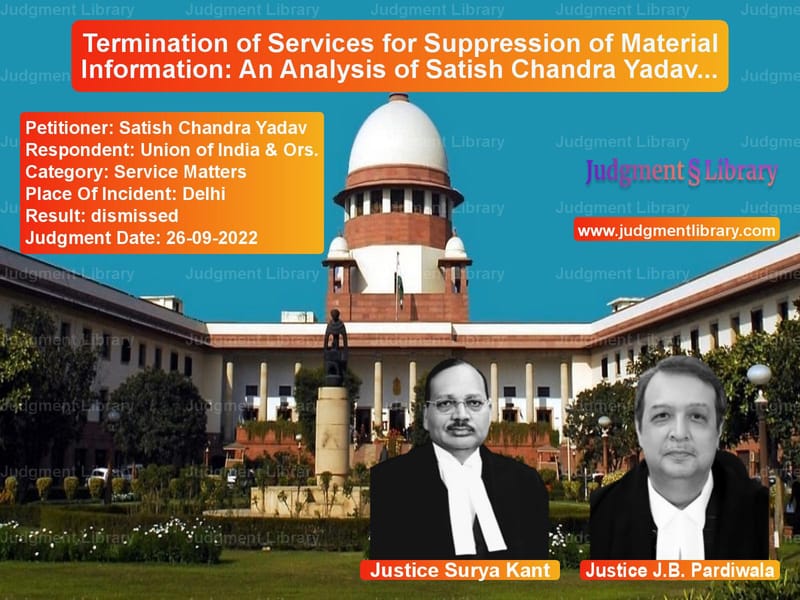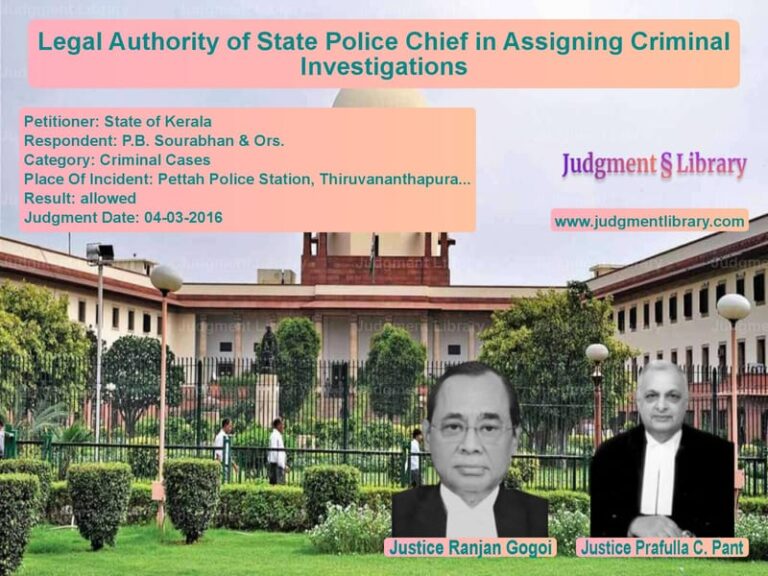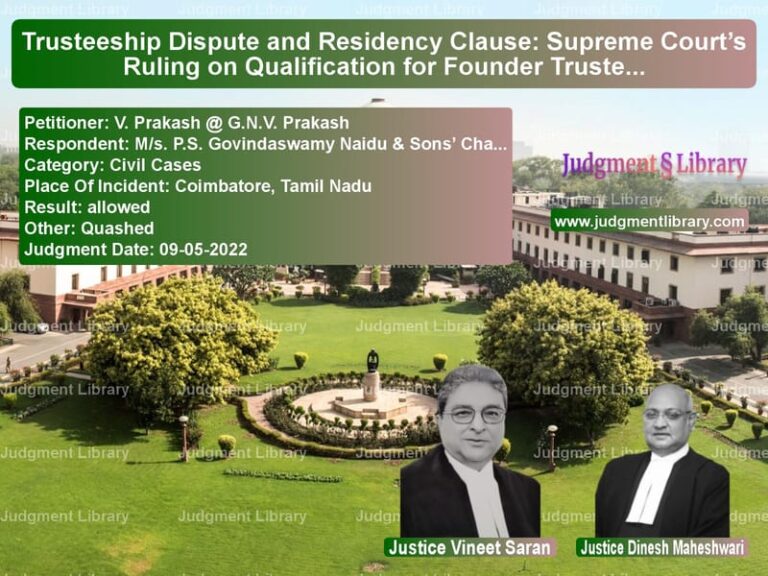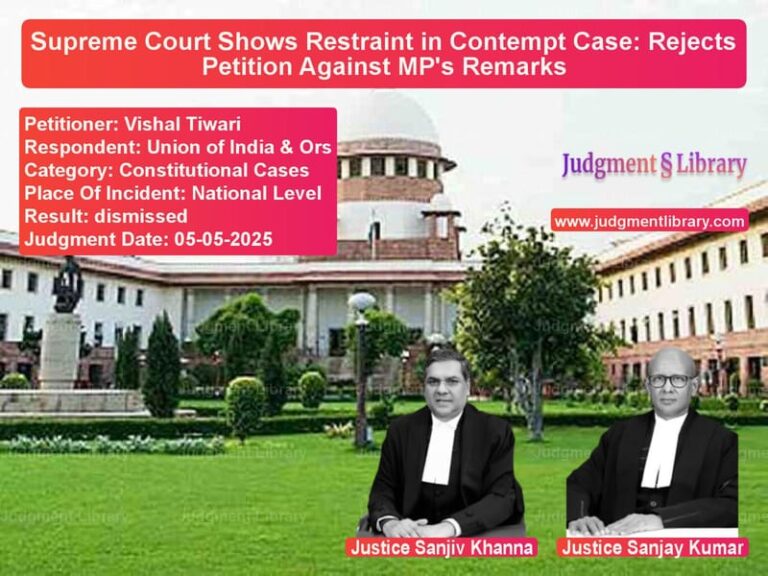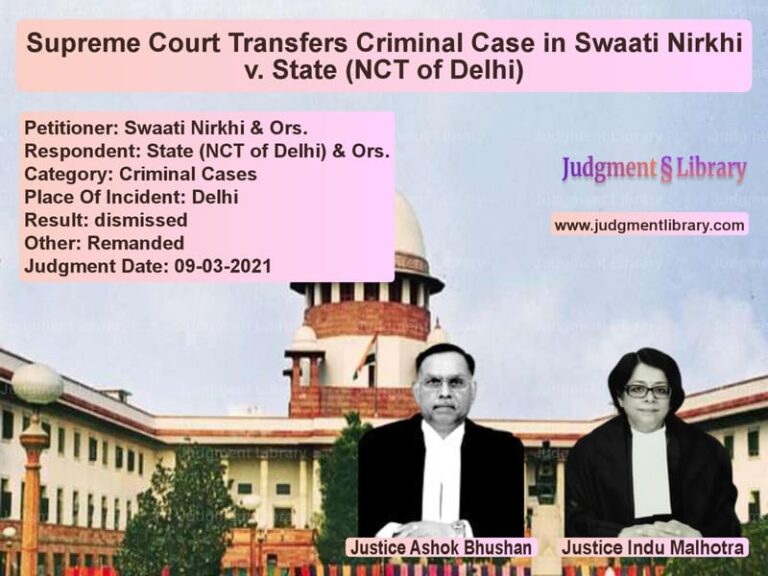Termination of Services for Suppression of Material Information: An Analysis of Satish Chandra Yadav v. Union of India
The case of Satish Chandra Yadav v. Union of India revolves around the termination of the appellant’s services as a Constable with the Central Reserve Police Force (CRPF) due to the suppression of material information during his recruitment process. The issue at hand concerns the appellant’s failure to disclose an ongoing criminal case against him when filling out the verification form, leading to his dismissal. The Supreme Court’s decision to dismiss the appeal highlights the significance of honesty in the recruitment process, especially for government and police services. This blog post delves into the arguments presented by both the petitioner and the respondent, as well as the legal reasoning behind the Court’s judgment.
Background of the Case
The appellant, Satish Chandra Yadav, was recruited as a Constable (General Duty) in the CRPF on 28th July 2014. During his recruitment, he was required to fill a verification form (Form-25), where he was asked about any pending criminal cases against him. In response, the appellant falsely answered in the negative. However, a criminal case was indeed pending against him in the district of Gorakhpur, Uttar Pradesh. This case involved serious charges under Sections 147, 323, 324, 504, and 506 of the Indian Penal Code (IPC). The criminal case had been filed in 2008, but at the time of filling the form in 2014, the appellant did not disclose this information.
When the CRPF conducted a character verification, the authorities discovered the pending case against the appellant. As a result, his services were terminated under Rule 5(1) of the Central Civil Services (Temporary Service) Rules, 1965, on the grounds of suppression of material facts. The appellant challenged this termination by filing a writ petition in the Delhi High Court, which was dismissed. He then filed an appeal before the Supreme Court.
Petitioner’s Arguments
Satish Chandra Yadav presented several arguments in his defense:
- Non-Disclosure of Criminal Case: The appellant argued that he was unaware of the criminal case against him at the time of filling the verification form. He claimed that he had been falsely implicated in a family dispute and that the case was later settled through a panchayat. The appellant further contended that the charges against him were minor and did not involve moral turpitude.
- Vague Nature of the Form: The appellant emphasized that the verification form, particularly the questions related to criminal cases, was vague and not specific. He argued that the form did not clearly explain the nature of the information being sought, which led to his confusion and the incorrect filling of the form.
- Younger Age at the Time of Incident: The appellant pointed out that at the time the criminal case was registered, he was only 19 years old and was not living in the village where the incident occurred. He argued that his age and the fact that the case stemmed from a family dispute should be considered as mitigating factors.
- Acquittal in the Criminal Case: The appellant also highlighted that he was acquitted in the criminal case, and the charges against him were dropped due to the hostile witnesses and the settlement reached between the parties involved. He argued that the acquittal should exonerate him and that he should not be penalized for a case in which he was eventually cleared.
- Precedent of Avatar Singh v. Union of India: The appellant relied on the Supreme Court’s decision in Avatar Singh v. Union of India, where the Court had emphasized that the suppression of material facts should be evaluated in light of the circumstances. The appellant argued that the same principles should apply to his case and that the termination was disproportionate to the offense.
Respondent’s Arguments
The Union of India, represented by the learned Additional Solicitor General (ASG), opposed the appellant’s arguments with the following points:
- Suppression of Material Facts: The respondent emphasized that the appellant had deliberately suppressed information about the criminal case pending against him. The respondent argued that the question regarding the criminal case was clear, and the appellant’s answer in the negative was a willful misrepresentation.
- Importance of Honesty in Public Employment: The respondent stressed that public employment, particularly in the police force, requires the highest standards of integrity. They argued that the suppression of material information regarding a criminal case is a serious offense in itself, as it undermines the trust and reliability expected from public servants, especially those in uniformed services.
- Acquittal Does Not Exonerate the Suppression: The respondent pointed out that the appellant’s acquittal in the criminal case did not absolve him of the consequences of withholding important information during his recruitment. They emphasized that the suppression of facts itself was a sufficient ground for termination, regardless of the outcome of the criminal case.
- Judicial Precedents: The respondent referred to several judicial precedents, including Avtar Singh v. Union of India and Union of India v. M. Bhaskaran, which reinforced the principle that suppression of material facts during recruitment can lead to termination from service. The respondent argued that the appellant’s conduct was inconsistent with the expectations of integrity in the police force.
- Discretion of the Employer: The respondent argued that the employer, in this case, the CRPF, had the discretion to terminate the appellant’s services based on the suppression of material information. They cited the case of Commissioner of Police v. Raj Kumar to assert that the decision to terminate an employee’s services for such suppression was within the employer’s discretion and should not be interfered with unless there was malice or illegalities involved.
The Court’s Reasoning
The Supreme Court, after considering the arguments presented by both parties, made the following observations:
- Importance of Integrity in Police Service: The Court reiterated that police service demands the highest level of integrity, as police officers are entrusted with upholding the law and maintaining public order. Any suppression of material facts, particularly regarding a criminal case, could undermine the credibility of the officer and the department.
- Suppression of Material Facts: The Court found that the appellant’s failure to disclose the pending criminal case in the verification form was a clear case of suppression of material facts. The Court emphasized that suppression of facts in such forms, particularly when it relates to a criminal case, is a serious offense that can justify termination from service.
- Legal Precedents on Termination: The Court relied on several precedents, including Avtar Singh v. Union of India and Kendriya Vidyalaya Sangathan v. Ram Ratan Yadav, which established that suppression of material facts during recruitment or service could result in dismissal or termination. The Court noted that the suppression of information had a direct bearing on the suitability of the appellant for service in the CRPF.
- Acquittal and Its Impact: The Court also addressed the appellant’s argument regarding his acquittal in the criminal case. While acknowledging the acquittal, the Court ruled that the suppression of information regarding the case was the critical factor. The Court held that even an acquittal does not automatically entitle a candidate to employment if the candidate has been dishonest or has suppressed relevant information.
- Probationary Status: The Court noted that the appellant was still a probationary employee at the time of his termination. As a probationer, the appellant’s suitability for the post could be assessed, and the suppression of material facts was sufficient grounds for termination during the probation period.
The Court’s Decision
The Supreme Court dismissed the appeal, agreeing with the High Court’s judgment. The Court made the following orders:
- Dismissal of the Appeal: The Court found no merit in the appeal filed by Satish Chandra Yadav and dismissed the same.
- Upholding of Termination: The Court upheld the termination of the appellant’s services, stating that the suppression of material facts during recruitment was a serious issue, and there was no reason to interfere with the employer’s decision to terminate the appellant’s services during the probation period.
Conclusion
This case highlights the importance of transparency and honesty during the recruitment process, especially for positions that require high levels of trust and integrity, such as in the police force. The Court’s decision reinforces the principle that suppression of material facts during recruitment can lead to termination, even if the candidate is acquitted in a criminal case. The case also emphasizes that candidates must be truthful in their declarations, as even minor omissions or misstatements can have significant consequences for their employment prospects in the future.
Read also: https://judgmentlibrary.com/acr-grading-dispute-union-of-india-vs-g-r-meghwal/
Petitioner Name: Satish Chandra Yadav.Respondent Name: Union of India & Ors..Judgment By: Justice Surya Kant, Justice J.B. Pardiwala.Place Of Incident: Delhi.Judgment Date: 26-09-2022.
Don’t miss out on the full details! Download the complete judgment in PDF format below and gain valuable insights instantly!
Download Judgment: satish-chandra-yadav-vs-union-of-india-&-ors-supreme-court-of-india-judgment-dated-26-09-2022.pdf
Directly Download Judgment: Directly download this Judgment
See all petitions in Employment Disputes
See all petitions in Public Sector Employees
See all petitions in Workplace Harassment
See all petitions in Termination Cases
See all petitions in Judgment by Surya Kant
See all petitions in Judgment by J.B. Pardiwala
See all petitions in dismissed
See all petitions in supreme court of India judgments September 2022
See all petitions in 2022 judgments
See all posts in Service Matters Category
See all allowed petitions in Service Matters Category
See all Dismissed petitions in Service Matters Category
See all partially allowed petitions in Service Matters Category

